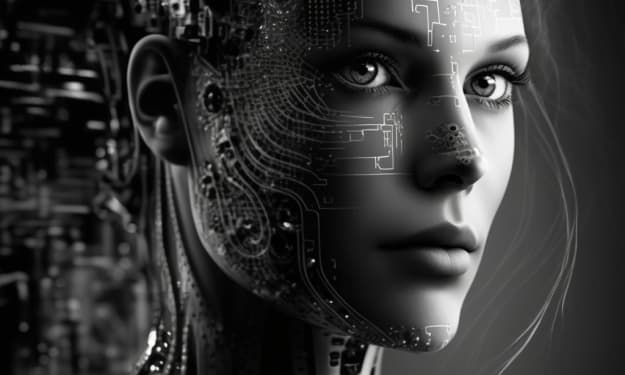AI: The Next Step In Human Advancement?
How to stay optimistic for the future

Article sponsored by AI-Info.org
AI and Human Advancement
AI is rapidly becoming an integral part of everyday life. It has been used in medical research, to improve efficiency and accuracy in manufacturing, and is even being applied to autonomous vehicles. As technology advances, the potential for AI applications expands beyond their current capabilities. With this comes the possibility that AI could increase human advancement in many areas.
One potential area where AI could have a significant impact on human advancement is in healthcare. AI-powered medical systems are being developed which can accurately diagnose illnesses with greater speed and accuracy than humans can manage alone. This could lead to faster diagnosis times and fewer misdiagnoses—potentially saving lives while enabling doctors to focus on more complex cases that require their expertise. It could also help streamline data collection processes, allowing clinicians to make more informed decisions based on real-time patient data.
Another area where AI could be beneficial is education: automated tutors powered by machine learning algorithms can provide personalized instruction tailored to individual student needs while providing feedback in real time; intelligent agents may be able to identify qualities or skills gaps among students; and predictive analytics tools may be able to identify patterns that teachers would not otherwise pick up on, providing them with valuable insights into how best to structure their classes for maximum student achievement. All of these possibilities show just a few ways that AI may have the power to revolutionize human advancement across multiple sectors of society.
AI's Benefits
AI has the potential to help us in many areas of our lives, from healthcare and transportation to business and finance. One of its greatest benefits is its ability to make more accurate predictions about the future. AI algorithms are used to predict market trends, automate customer service tasks, and analyze data faster than ever before. This allows businesses to focus their resources on more productive activities that create value for their customers.
Another benefit of AI is its ability to process large amounts of data quickly and accurately. This can be used in medical research and healthcare by analyzing patient records or other health-related information in order to find new treatments or cures for diseases. AI can also be used in transportation systems such as self-driving cars which promise safer roads with fewer accidents due to their advanced sensors and navigation capabilities. Finally, AI technology can also be used for security purposes by detecting suspicious behavior or recognizing potential threats before they occur.
Challenges of AI Implementation
One major challenge of AI implementation is the lack of public trust. This is often due to a fear of the unknown and a feeling that machines will not be able to act in our best interests. In order for AI to be fully embraced, it must build up trust with the general public before becoming widely accepted.
Another key challenge is the potential for algorithmic bias. If data used by AI systems is biased or incomplete, this can lead to incorrect predictions or decisions being made which could have serious consequences. It’s important for companies that implement AI to ensure their data sets are accurate and free from bias so as not to inadvertently discriminate against any particular group of people.
Finally, there are also concerns about cybersecurity when it comes to implementing AI technology. Since most AI systems rely on large amounts of data stored in a digital form, they can become targets for malicious attacks if security measures aren’t in place. Companies need to make sure they have robust cybersecurity protocols in place before rolling out their AI system so as not expose themselves or their customers’ data at risk.
Potential Impact on Humanity
The potential impact of AI on humanity could be revolutionary. We are already seeing the beginnings of it in terms of automation, self-driving cars, and even healthcare applications that incorporate AI. If these technologies continue to grow and develop, we could see a much quicker transition towards a more automated world, with fewer jobs for humans but an increase in efficiency and accuracy. Additionally, AI may create new opportunities for us to explore areas we never thought possible before. This could range from exploring deeper into space to making groundbreaking medical discoveries by utilizing data from vast sources around the world.
On the other hand, there is still some unease about using artificial intelligence due to its unpredictability and potential for misuse by malicious actors. Companies developing AI must ensure that appropriate safeguards are put in place so as to not cause disruption or harm through their technology and maintain ethical standards when it comes to privacy rights and transparency.
Potential for the Future
The potential for the future of AI is vast. A recent study from McKinsey Global Institute suggests that AI-driven automation has the potential to boost global productivity by up to 1.2% annually, and increase labor output by up to 0.8%. This could potentially lead to an additional $13 trillion in global economic activity by 2030, which would be a dramatic improvement over current levels of growth.
AI technology could also enable us to make smarter and more informed decisions about our lives, businesses, and environment. For instance, AI-powered algorithms can sift through enormous amounts of data quickly and accurately in order to find insights that humans may have missed or overlooked. AI-driven analytics can then be used to make predictions about how certain events may unfold in the future, enabling us to better prepare for them ahead of time. Additionally, AI systems can be used as personal assistants or advisors who can provide tailored suggestions based on individual preferences or needs.
Finally, as AI technology continues to advance and become more sophisticated over time, it will offer new opportunities for innovators across a range of industries and sectors—from healthcare and transportation, to energy production and environmental protection—and create innovative solutions for some of the world's most pressing problems.
Regulation of AI
AI has become increasingly popular in recent years, and its use is only expected to grow further. With this increasing popularity, it is necessary for there to be some regulation of AI's development and implementation. One of the most important regulations focuses on data privacy concerns. Companies must make sure that they are transparent about how they utilize personal data collected from users, as well as put safeguards in place to protect user information from being leaked or misused. Additionally, governments should require companies to disclose any potential risks associated with using AI technology so that consumers can make informed decisions about their usage.
Another important regulation involves the ethical implications of AI usage. Governments should set up guidelines for companies to follow when developing and utilizing AI technologies, such as ensuring that algorithms used in decision-making processes are fair and do not discriminate against certain groups of people or unfairly favor others. Additionally, companies should be held accountable if their algorithms lead to biased results or unfavorable outcomes for specific individuals or groups. Finally, it is essential for governments to monitor AI technologies closely and ensure that their use does not violate any laws or international standards related to human rights and safety issues.
Ethical Considerations
The ethical considerations of AI are complex and multifaceted. One major consideration is the potential for AI to be used as a tool of oppression or control, allowing governments and private entities to manipulate people's behavior, opinions, and emotions. The power of AI can also be used to discriminate against vulnerable populations, such as those with disabilities or lower socio-economic status. It is important for governments and organizations that develop artificial intelligence systems to ensure that these systems are designed in a way that does not violate any fundamental human rights or lead to exploitation or abuse.
Another ethical consideration is the potential risk posed by autonomous agents or machines operating without sufficient safeguards in place. In some cases, these agents could act in ways that are potentially dangerous if left unchecked, such as using lethal force without proper authorization. To mitigate this risk, it is important for developers to create systems with appropriate oversight and safety protocols in place so that any unintended consequences can be quickly identified and addressed.
Finally, there is the issue of privacy when it comes to collecting data from individuals through AI-based systems. Organizations must ensure they have adequate data protection measures in place so that personal information collected by their AI applications cannot be abused or misused by third parties. Furthermore, they should also strive to use transparent methodologies when gathering data so that users understand how their information will be used and protected at all times.
Conclusion: Optimism for the Future
With advancements in AI technology, there is much to be optimistic about when it comes to the future of humanity. AI has the potential to solve many of our world’s greatest problems, from healthcare and poverty to climate change. As we continue to explore this technology and its applications, we can look forward with hope that AI will bring us closer together as a species and help us create a brighter future for all.
However, with this optimism also comes responsibility—we must ensure that the development and implementation of AI is done ethically and responsibly. It’s important that decision makers take into account the safety of humans, animals, and other forms of life on Earth before creating any type of machine-learning system or artificial intelligence. We must also be mindful not to treat these technologies as ends in themselves but rather use them as tools to further our collective goals while recognizing their limits.
Overall, there is much reason for optimism when it comes to AI technology and how it could shape our future if used responsibly. As we move forward into the age of intelligent machines, let’s strive towards building a better tomorrow for everyone by making sure any kind of advancement is made with consideration for each other’s well-being in mind.
About the Creator
Patrick Dihr
I'm a AI enthusiast and interested in all that the future might bring. But I am definitely not blindly relying on AI and that's why I also ask critical questions. The earlier I use the tools the better I am prepared for what is comming.






Comments
There are no comments for this story
Be the first to respond and start the conversation.